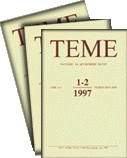ОРГАНИЗАЦИЈА И ПОЛОЖАЈ ИСЛАМСКЕ ВЕРСКЕ ЗАЈЕДНИЦЕ У КРАЉЕВИНИ ЈУГОСЛАВИЈИ
Organisation and Position of the Islamic Religious Community in the Kingsom of Yugoslavia
Author(s): Dragan NovakovićSubject(s): History
Published by: Универзитет у Нишу
Keywords: Islamic community; Islam; religious schools; religious instruction;
Summary/Abstract: The complex conditions in which the Kingdom of Serbs, Croats and Slovenians was formed also affected the organisation and position of the Islamic religious community. By the decision of dominant political forces the former organisation was preserved, entailing practically independent status and operation of the two parts, run by the Reis-ul-Ulema in Sarajevo and head mufti in Belgrade. The change of state and national policy, following the coup in January 1929, resulted in the adoption of a law whose provisions redefined to a certain extent the relations between the largest religious communities and the state. Pursuant to the relevant law, central bodies were formed, establishing formal organisational unity of the Islamic religious community in the entire state territory, since the vakuf property continued to be managed by independent bodies with a seat in Sarajevo and Skopje. The state kept significant supervisory functions over religious life, Islamic education and organisation of Islamic religious instruction in state and private schools. The aggravation of the overall political situation, which was at the domestic level marked by the assassination of King Alexander, and internationally by the victory of Nazism in Germany, placed before the government a serious task to ensure support of the most important representatives of the numerous Muslim collectivity for the planned policy. The Muslim representative Mehmed Spaho made the support to the government policy conditional upon the repeal of the existing legislation and Constitution of the Islamic Religious Community. Forced to compromise, the Government accepted the demands, so a new law and Constitution of the IRC were adopted, creating preconditions for new elections and elimination of Spaho's opponents among the leaders of the religious community. With the new legislation, the IRC was to a great extent restored the right of independent appointment of almost all the bodies, as well as the freedom of disposing with property, under general supervision of the state. By putting forward a political request, which the government was forced to accept, the Muslim collectivity sent a clear message before the great world conflict that it possessed real power that had to be taken into account in the future.
Journal: Teme - Časopis za Društvene Nauke
- Issue Year: 2003
- Issue No: 03
- Page Range: 451-474
- Page Count: 24
- Language: Serbian

